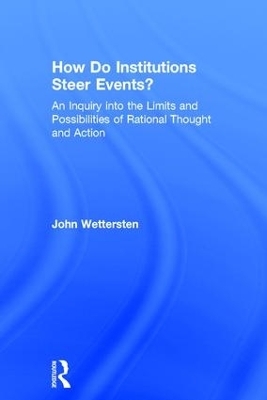
How Do Institutions Steer Events?
Routledge (Verlag)
978-0-7546-5357-8 (ISBN)
Theories of explanation in the social sciences vacillate between holism and individualism. Wettersten contends that this has been a consequence of theories of rationality which assume that rationality requires coherent theories to be shown to be true. Rejecting these traditional assumptions about rationality Wettersten claims that the traditional explanations of rationality have placed unrealistic demands on both individuals and institutions. Analysing the theories of Weber and Popper, Wettersten shows that Popper made considerable progress in the theory of rationality, but ultimately stayed too close to the ideas of Hayek, he explains how this dilemma leads to difficulties in economics, anthropology, sociology, ethics and political theory, and constructs an alternative theory that rationality is critical problem-solving in institutional contexts. Wettersten contends that 'the critical consideration of theories followed by their improvement' dispenses with the need for justification and sees rationality as a social phenomena with an institutional basis. The main social advantages this view offers is that the degree of rationality individuals achieve may be increased by institutional reform without moralizing and that we can explain how institutions steer events insofar as we understand how they determine the problems which individuals seek to solve. It is argued that the central moral advantage of this view is that rationality is shown to be Spinozistic in the sense that it is natural and furthers morality and peace of mind.
John Wettersten is the Adjunct Professor for the Philosophy of Science at the University of Mannheim, Germany.
Contents: Preface; Introduction. Part 1 Philosophical Background: Weber and Popper: The limits of Weber's methodological individualism; Popper posed and solved new problems, but more was possible. Part 2 Why the Social Sciences Need an Alternative Theory of Rationality: Problems with individualist social theory; How can individualism account for institutions?; Limits of rationality call for a new ideal; Albert's critique of neoclassical economics fails to show a way forward; Problems with the rationality principle; Social anthropology remains too holistic; Traditional theories of rationality harm political theory and ethics. Part 3 Fabillist Institutionalism: Rationality is problem-solving, critical and social; How are institutions and individuals related?; How to study institutions; Institutions which hinder rationality; How can social reform be critical?; Institutions and ethics. Conclusion: Spinoza's project and social science today; Appendices; Bibliography; Index.
| Erscheint lt. Verlag | 9.3.2006 |
|---|---|
| Verlagsort | London |
| Sprache | englisch |
| Maße | 156 x 234 mm |
| Gewicht | 453 g |
| Themenwelt | Geisteswissenschaften ► Philosophie ► Erkenntnistheorie / Wissenschaftstheorie |
| Sozialwissenschaften ► Politik / Verwaltung ► Politische Theorie | |
| Sozialwissenschaften ► Soziologie ► Allgemeines / Lexika | |
| ISBN-10 | 0-7546-5357-9 / 0754653579 |
| ISBN-13 | 978-0-7546-5357-8 / 9780754653578 |
| Zustand | Neuware |
| Haben Sie eine Frage zum Produkt? |
aus dem Bereich

![Was heißt Denken?. Vorlesung Wintersemester 1951/52. [Was bedeutet das alles?] - Martin Heidegger](/media/113619842)
